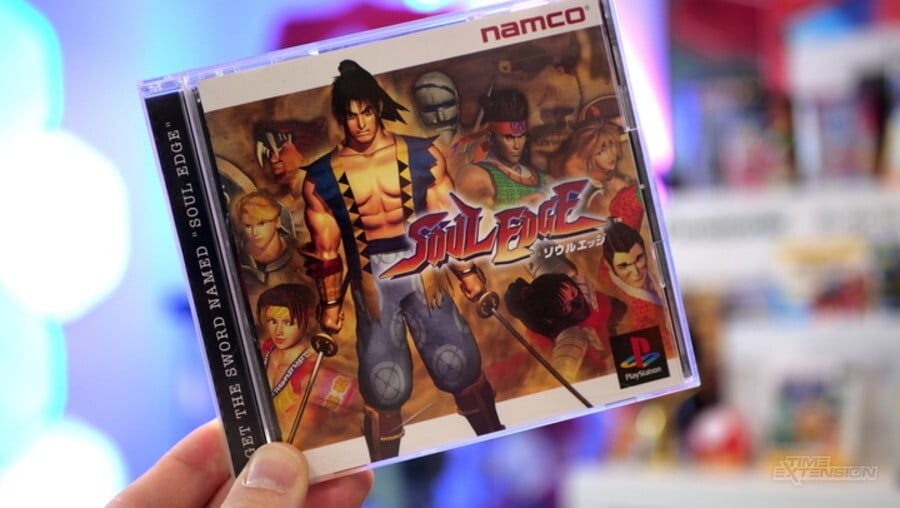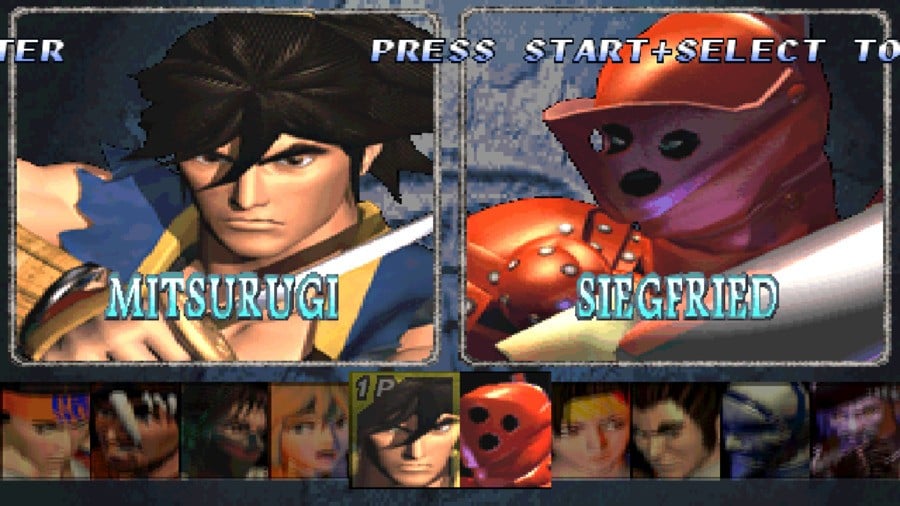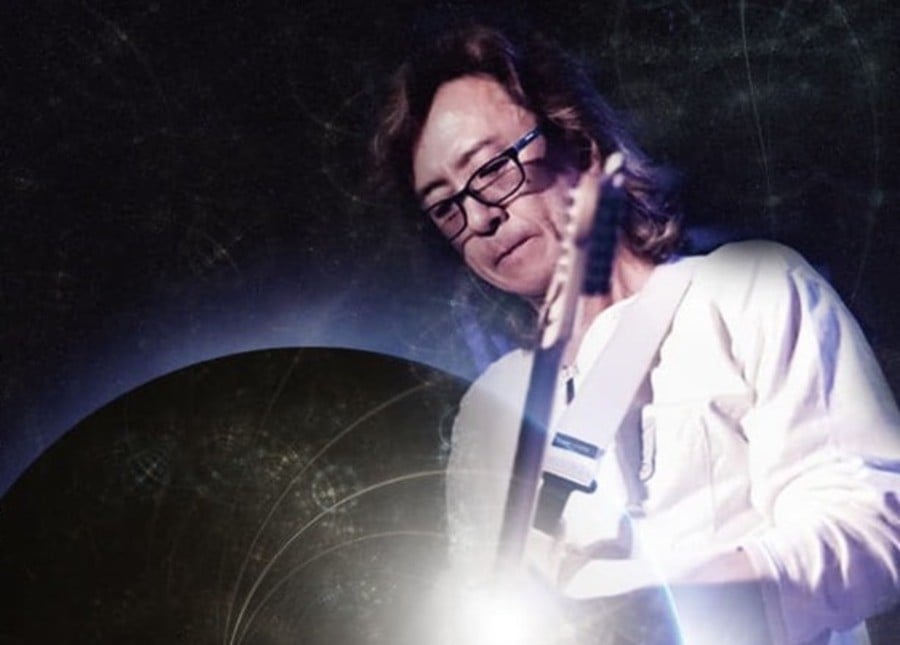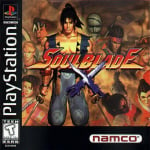
When it comes to picking the best video game opening of all time, there are obviously a lot of amazing candidates. However, there is one that always sticks in my mind for longer than most.
That is the opening to the 1997 PlayStation port of Namco's weapons-based fighter, Soul Blade (otherwise known as Soul Edge, if you live in Japan or North America). In contrast to the original arcade game, which was released one year prior, the PlayStation version featured a cutting-edge FMV cutscene that introduced each character's story with action-packed vignettes, accompanied by an energetic theme song, entitled 'Edge of Soul', that combined traditional Japanese and traditional instruments with a classic rock sound.
For decades, it's safe to say I've been more than a little bit obsessed with this song, often pulling it up on YouTube when I'm in need of a morale boost. But, looking into its history online, I was surprised at just how little information was available about its origins or the group who wrote it, spotting a potential story that was just waiting to be uncovered. As a result, I set out several years ago to try to uncover the history of one of fighting game's most beloved themes, with my very first task being to try and locate the people responsible.
Thankfully, when I first started looking into the background of this musical piece, there were already a few clues available to me, to help kickstart my search. The PlayStation credits, for instance, listed the composer Benten-Maru as being responsible for writing the song alongside a lyricist named Suzi Kim, with their efforts being part of something that was referred to as the KHAN Super Session.
Seizing upon this information, I immediately started messaging ex-Namco devs and looking up various Benten-Maru's and Suzi Kim's on social media platforms, to see if I could find anyone with any connection to the company, with my working theory being that KHAN must have been some internal band inside the company. And it was through this search in 2022 that I ended up coming across a VGMdb entry, revealing Benten-Maru's real name to be Masahiro Ohki, which then led me to another website (written in Japanese) featuring a blog post from a Japanese user named Kashima.
Remarkably, looking at this blog, it seemed that this individual across the globe had beaten me to the punch, tracking down several members of KHAN and identifying them not as a Namco-specific band, but as a Japanese rock group who just happened to be hired by the game developer for that specific project. They had even included links on how to get in touch with some of its members, but stopped short of interviewing them themselves.
This led me to shooting some opportunistic emails over to the song's composer Masahiro Ohki and its singer Mickie, in the hopes of potentially landing a couple of interviews.
Masahiro Ohki was the first to respond. Then living as a solo artist and music teacher in Chiba Prefecture, he had quickly replied after I messaged his music school's website and agreed to answer all of the questions I had about the group over email (leading me to publish this particular news article roughly three years ago). Mickie, on the other hand, proved to be a much more difficult person to get in touch with, with all of my attempts to contact her going unanswered up until last month, when out of the blue, I stumbled across a previously undiscovered Facebook page for her singing career, and decided to try to establish contact one final time.
Given all my other messages had winded up going undelivered, I didn't have much hope of hearing back and assumed this one would also find itself getting lost in a digital abyss. However, as I got into bed that night, I saw my phone light up across the room, with a notification confirming that she had read and agreed to my request. So, with the help of Japanese-to-English translator Liz Bushouse, I set out to finish what I had started, documenting the band's memories of recording their inspirational anthem.
The story of KHAN, according to both of musicians, begins with another earlier rock group named A・JYOTA, which the Japanese producer Shigeaki Shiratori established in 1991. This was a group that similar to KHAN aimed to combine pop music with Japanese traditional instruments, with Masahiro Ohki and Mickie being among its long list of band members.
"A・JYOTA had its CD debut in 1992," Mickie tells me. "It was a large project that combined our pop music team and a team that played traditional Japanese instruments, including a shamisen expert. After the debut, we spent one or two years doing TV music shows, radio appearances, independent concerts at the Hibiya Open-Air Concert Hall, a theatre tour within Japan, an independent concert at the Roxy in Los Angeles, appearances at the Ryoichi Hattori Music Festival, and more.
"We were really active, cooperating with large companies. Japan was just in the middle of its economic bubble and was thriving. But then, the bubble burst; Miyuki, the other singer, left; and things basically ground to a halt."
As Mickie explains to us, by 1995, A・JYOTA was pretty much over and done with, but another opportunity would soon appear, with Namco contacting the producer Shigeaki Shiratori about a new game it was working on, which would later become known as Soul Blade.
As the story goes, at the time, Namco was looking for a Japanese band to provide the music for the home console version of this title, so the producer Shiratori decided to create a new group, called KHAN, in order to fulfil this role. This group would notably contain a bunch of former members of A・JYOTA and would center on a core group of four musicians (Masahiro Ohki, Kinosuke, Chika, and Mickie), with several other performers providing backup on the band's recordings.
Speaking to us back in 2022, Ohki remembered the group's origins: "I was playing in a rock band that used traditional Japanese and Asian instruments when we were contacted by the video game company Namco. At that time, it was our first collaboration on a game. I remember the musicians and staff staying up late into the night swapping creative opinions. And we'd also have some great-tasting food and drinks.
"I did some jam sessions with top-rate musicians," he also stated. "But there is also one more thing I remember. I remember I was able to bring my students into the studio to show them what the process of recording and development looked like. I'm sure that was an amazing experience for them."
In the end, KHAN would record 16 tracks for the game's soundtrack, which would be composed by a range of artists. This included music for each of the individual characters stages and an intro and ending theme that would be released as a single (called 'Edge of Soul' and 'On Our Way Home' respectively).
As Ohki told me, he was responsible for writing the music for both of these tracks, but he wasn't the only person that was involved in their initial creation, with the musician also mentioning the songwriter named Suzi Kim who provided lyrics, and an individual named Kazunori Miyake who assisted with the arrangement of 'Edge of Soul' and would go on to provide its memorable Koto solo. In order to help KHAN write all these songs in a short amount of time, Namco furnished the group with various assets from the game, including images of each character, a description of the game's premise, and an early look at the storyboards for the CG intro, with the latter two helping to shape the lyrics to the legendary intro theme.
"In the game, you travel around fighting strong people from various countries while searching for a legendary sword named 'Soul Edge'," Ohki explained. "If a person with a righteous heart obtains Soul Edge, it becomes a sword of justice that saves the world. But if someone evil gets it, it transforms into a sword that destroys the world. We, too, stand on the edge of a precipice, our souls roused, re-evaluating ourselves and the razor sharp edge of our souls. That's the kind of meaning that's included in the title of the song."

Reflecting on the process of what it was like recording for the game, Mickie refers to it now as "an amazing experience", though explains it turned out to be a lot more work than she initially expected. This is because the backing vocalists that were originally booked for the session ended up no-showing on the day, leading her to have fill in for their roles, in addition to performing her own parts.
"We had a chorus with us at the start, but on the day of the recording they ended up not coming," she says. "I can't remember why. We didn't have time to find any replacements, so I suddenly had to sing everything. Given the circumstances, all I could do was buckle down and give it my best shot.
"On the first day of recording for The Edge of Soul, even though we had cutting edge technology, it still took a while compared to today, and there was a lot of waiting around as the chorus was layered in. I ended up singing from morning until late at night. As you'd expect, my voice was shot the next day and I couldn't sing at all. I clearly remember Suzi Kim yelling at the producer and staff for me on the second day, saying 'You need to value your singers more! Didn't you consider what would happen if you made them sing all day long?!'"

Despite this heavy workload, she ended up nailing her parts on songs like "Edge of Soul", "On My Way Home", and "Tiny Amulet" (Seung Mina's theme), attributing her spectacular performance on the 'Edge of Soul' specifically to "a strange power" that welled up within herself while recording.
"So much happened once I became involved with A・JYOTA that I can't talk about it," she reflects. "When we debuted again as KHAN, the members all vowed to work together to fight to make it onto the world stage. So I believed that the truth would prevail no matter what. I put that sentiment, as well as my soul, into the song. I remember when we started recording, I felt a strange power well up within me. I opened my mouth and it was like I could see a light, so I turned toward that as I sang. I guess you could say I was in the zone. I still remember that feeling today."
While speaking to both musicians, it was very clear that KHAN didn't end up staying together for that long after the release of the game and its accompanying soundtrack. Ohki instead went back to teaching and would eventually start performing as a solo artist — something he continued to do up until his passing in October 2024, which we first heard of while putting together this article.
Mickie, on the other hand, "lost faith in humanity, hit rock bottom, and became a shut-in" immediately after the dissolution of the group, before a friend encouraged her to train as a voice instructor, giving her a renewed sense of purpose. From here, she has gone on to teach gospel music in Japan, train various young performers aged between 6 to 23 to sing and dance, and perform in several acts, including "Mickie & New Frontier" and "Moon Garden" — both of which are still active to this day.
Speaking about the popularity of 'Edge of Soul', Mickie tells us that she didn't know much about the song's popularity, and hasn't ever met any fans in person. However, she has since seen YouTube comments and has been taken aback by the positive comments about her performance.
"Both A・JYOTA and KHAN were swept up in the stormy waves of the times and the fusion of new music," she tells me. "We were pioneers, struggling and fighting as best we could. And I think The Edge Of Soul embodies that struggle perfectly, for both the game designers and us musicians. The fact that there are still so many people out there who love it is one of my life's greatest treasures."
"I just finished an immensely successful concert with "moon garden" at a live music club called Wonder Wall on May 22 of this year, but I've actually been battling cancer since spring of last year and I need to keep my health in mind as I continue to plan future activities. I go through major ups and downs because of the side effects of my treatment, and I have less stamina now, but I've never let that discourage me, and am determined to think only about pressing forward and doing what I can as I heal."
She continues, "I think the sword in my heart is aflame again now that I'm battling a life-threatening illness. "moon garden"'s next concert will be at Wonder Wall on November 21. Until then, I'm going to do something new and sing jazz, which I've always wanted to try. That's planned for July 4th and August 15th at a small store called CASK in Yokohama. I won't falter. I won't succumb to fear. Every day my friends are there for me. Every day I'm going to have faith and press forward. That's what The Edge Of Soul means to me right now."


